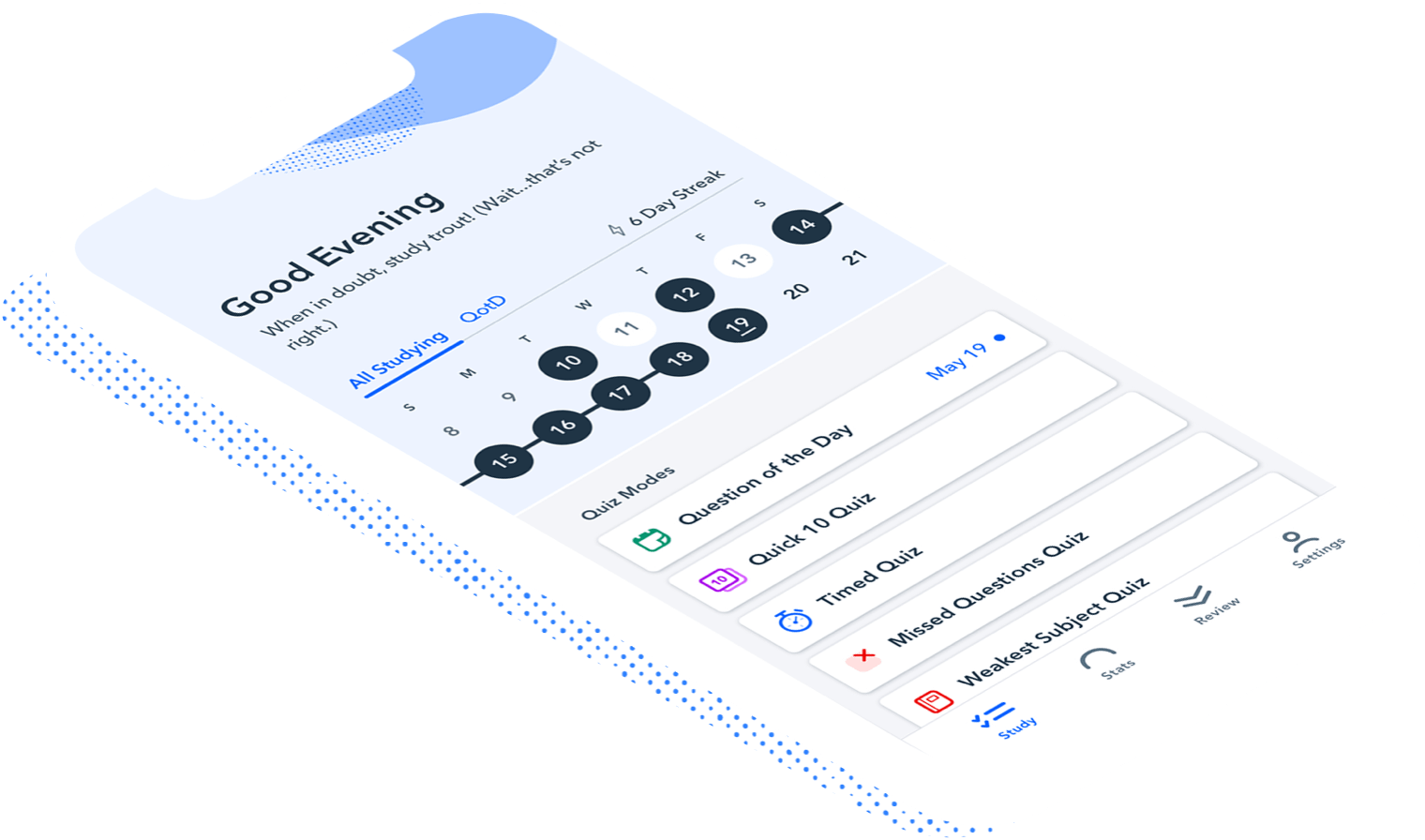Prep with the pros
This is what kicking down that door to your success and chopping it into tiny pieces feels like. At Pocket Prep, we’ve got your back because all of our practice questions are written by industry pros, and based on the latest exam blueprints available and each question comes with detailed explanation.
View all 4 GED® Subjects
Mathematical Reasoning
89%
8 of 9 Correct
Reasoning Through Language Arts
56%
5 of 9 Correct
Science
55%
6 of 11 Correct
Social Studies
38%
3 of 8 Correct
Our apps identify your trouble areas and give you the tools to turn them around.
Built for the busy
Study wherever, whenever with these quiz types:
Question of the Day
The quickest way to do a little studying everyday.
Quick 10 Quiz
10 questions randomly selected from the question bank.
Missed Questions Quiz
Retake questions you’ve missed and improve your overall score.
Level Up Quiz
Gamify your learning with progressively harder quizzes.
Weakest Subject Quiz
Focus on questions from your lowest subject score.
Timed Quiz
Have 5 or 10 minutes to invest in some study time?
Build Your Own
Select how many questions and what subjects to focus on.

See Your Progress
Detailed results show where you're doing well and where you should focus.
Gauge Where You Are
Your overall study score and how you compare to others.
Keep Up the Streak
A little each day helps you stay on track for your exam.
Unlock your potential and open new doors to  success with the GED® – your pathway to high school equivalency, greater opportunities, and a brighter future!
success with the GED® – your pathway to high school equivalency, greater opportunities, and a brighter future!
 success with the GED® – your pathway to high school equivalency, greater opportunities, and a brighter future!
success with the GED® – your pathway to high school equivalency, greater opportunities, and a brighter future!
The GED® (General Educational Development) test is a high school equivalency exam administered by GED Testing Service. It is designed for individuals who did not complete high school and want to earn a credential equivalent to a high school diploma. The GED® consists of four subject tests:
- Mathematical Reasoning: The math section challenges test-takers with a variety of mathematical problems covering quantitative and algebraic problem-solving. This includes, but is not limited to, arithmetic, algebra, geometry, and data analysis. The aim is to assess the candidate's ability to apply mathematical reasoning in practical contexts. Test-takers have 115 minutes to complete this section, and the use of a calculator is permitted for most of the test.
- Reasoning Through Language Arts (RLA): This section evaluates a test-taker's abilities in reading comprehension, writing, and editing. It consists of reading passages from both literary and non-fiction sources, and test-takers must demonstrate their ability to understand, interpret, and analyze these texts. Additionally, the writing component requires the production of an extended response (essay) that assesses the candidate's ability to argue or explain a point with evidence. The RLA section lasts for 150 minutes, which includes a 10-minute break.
- Science: This part of the exam tests the candidate's understanding of fundamental concepts in physical science, life science, and earth and space science. It requires the application of scientific reasoning, the interpretation of data, and the evaluation of hypotheses and experimental results. The science test lasts for 90 minutes and includes a variety of question types, such as multiple-choice, fill-in-the-blank, and short answer.
- Social Studies: The social studies section assesses knowledge and skills in the areas of U.S. history, civics and government, economics, and geography. It measures the ability to understand and analyze historical events, interpret maps and data, and evaluate arguments and opinions based on evidence. This section is 70 minutes long and, like the science section, features a mix of question formats.
The GED® serves a wide audience, helping millions of people worldwide to achieve their educational and career goals.



Essentials
GED® is part of our Essentials Pocket Prep that contains prep content for 9 other Essentials exams.
View
other 9 Essentials exams


 Study Questions
Study Questions
 5 Star Reviews
5 Star Reviews
 Avg App Store Rating
Avg App Store Rating








